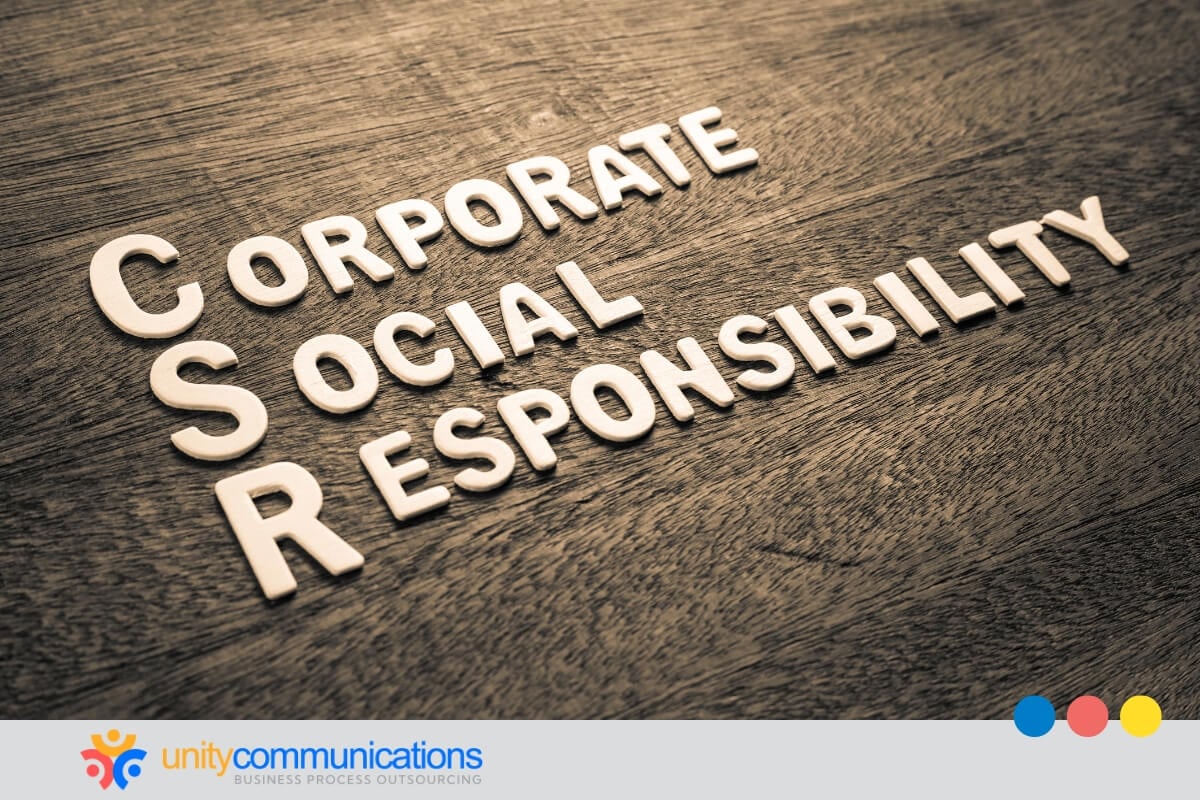Table of Contents
Around 50% of business process outsourcing (BPO) providers consider environmental, social, and governance (ESG) as a focus area. Thus, the sector is quickly becoming a driver for eco-friendly initiatives across various client industries, including financial technology (fintech).
This growing focus on sustainable practices in fintech BPO can significantly benefit businesses and operations in the sector.
If you want to learn more about how fintech BPO companies exercise and promote green initiatives, this article is for you. It dives deep into the sector’s environmental consciousness.
The emergence of green fintech BPO

Fintech BPO providers that adopt eco-friendly practices are part of a more significant movement: green fintech.
This sector is the intersection of fintech and environmental sustainability. Green fintech uses innovative technology to promote eco-friendly goals.
A good example is mobile banking. It reduces the need for paper production, which negatively hurts the environment through deforestation and carbon emissions.
These practices have become widespread across fintech businesses. According to Global Market Estimates, the global green fintech market could achieve a 22.4% compound annual growth rate (CAGR) from 2024 to 2029.
Green fintech BPO emerges from this growing movement. Several factors contribute to its development, including:
- Regulatory pressure from frameworks focusing on ESG factors and combating climate change
- Corporate social responsibility (CSR) that makes fintech BPO companies recognize their role in sustainability
- Customer and investor expectations shifting toward eco-conscious businesses
Environmentally sustainable practices in fintech BPO operations

Outsourcing has become a crucial catalyst for the accelerated adoption of sustainable business practices. According to Deloitte, 59% of BPO companies support and focus on ESG processes.
From call centers to employer of record firms, service providers implement various strategies to achieve environmental sustainability in their processes and operations.
Here are the core practices green fintech BPO companies adopt:
1. Eliminating paper use by embracing digital solutions
BPO companies leverage digital solutions to significantly minimize paper consumption and waste generation. Those specializing in the fintech industry utilize the following technologies to help clients reduce paper consumption and waste without compromising their processes:
- Electronic forms and data capture enable online versions of applications, surveys, or internal documents.
- Optical character recognition (OCR) technology converts scanned paper documents into editable digital formats.
- Document management systems (DMS) are secure cloud-based platforms that allow stakeholders to store, organize, and access documents electronically.
Outsourcing paper-reliant tasks, such as data entry and document processing, eliminates the need to create and distribute paper versions, which contribute to waste generation. It also significantly reduces the deforestation associated with paper production.
Besides being a sustainable practice, this fintech BPO strategy benefits operations by improving efficiency, enhancing security, and reducing costs. Going paperless simplifies document access and collaboration while also improving data security through encryption, access controls, and backups.
2. Optimizing energy consumption with eco-friendly infrastructure
Data centers, such as contact centers for e-commerce, are the backbone of BPO operations. However, they are major energy guzzlers. Heat-generating servers and their cooling systems burn fossil fuels, such as coal and natural gas, releasing greenhouse gases.
Energy-efficient data centers and infrastructure are a must for fintech BPO companies that focus on green initiatives. Established providers leverage economies of scale to invest in large-scale, sustainable systems and servers, such as the following:
- Smart cooling technologies (e.g., automated temperature control systems)
- Green networking tools (e.g., energy-efficient routers and switches)
- Omnichannel solutions (e.g., unified customer interaction platforms)
- Cloud computing (e.g., contact center as a service [CCaaS])
They also embrace server consolidation, replacing multiple older servers with fewer, more powerful machines. These high-performance computer programs can handle the workload of several older ones, significantly reducing energy consumption.
Virtualization technology takes this a step further. It allows one physical server to host and run multiple virtual machines. BPO providers that leverage this tool can better allocate resources based on workload demands, ensuring unused servers don’t consume energy.
3. Minimizing carbon emissions through remote solutions
Another sustainable practice in fintech BPO operations is the implementation of remote work setups. Most outsourced tasks, such as information technology (IT) helpdesk, administrative support, and even customer service, can be done effectively anywhere with an internet connection.
Such arrangements can significantly contribute to green initiatives. A study published on the Proceedings of the National Academy of Sciences (PNAS) website supports this claim. According to its results, teleworkers have a 54% lower carbon footprint than those who work on-site.
One way remote work helps minimize carbon footprints is by eliminating daily commutes to an office. This simple practice lowers greenhouse gas emissions from cars and other transportation methods and reduces traffic congestion, ultimately lowering noise and air pollution.
Another way remote work helps the environment is through a smaller office footprint. Requiring less office space minimizes energy consumption for:
- Printers and photocopiers
- Servers and network equipment
- Lighting
- Heating, ventilation, and air conditioning (HVAC) systems
- Standby power
- Personal device charging
- Excess use of equipment
To maximize sustainability in remote work setups, outsourcing providers typically promote energy-efficient habits. They encourage employees to utilize energy-efficient technology and adopt responsible practices such as turning off electronics when not in use.
Sustainable remote work arrangements and practices through fintech BPO operations translate to a lower carbon footprint for companies that outsource. At the same time, this setup allows them to save significantly on overhead costs.
4. Promoting proactive sustainability through responsible sourcing
Green fintech BPO providers recognize the impact their supply chain choices have on the environment, so they practice responsible sourcing.
This proactive approach to sustainability considers the potential environmental effects of materials and services they acquire for operations. It minimizes resource extraction and promotes recycling throughout the supply chain, leading to a smaller environmental footprint.
Here are a few ways green fintech BPO providers practice sustainable sourcing:
- Establishing clear standards for equipment selection and purchasing
- Prioritizing equipment with longer lifespans, modular components, and energy-efficient features
- Partnering with manufacturers or electronics resellers for trade-in or buy-back transactions
- Researching an equipment’s production process
- Seeking out manufacturers who utilize recycled materials or minimize harmful emissions during production
- Actively seeking out office supplies made with a high percentage of post-consumer recycled content
- Finding eco-friendly alternatives for products that cannot be made entirely from recycled content
5. Reducing negative impact through proper e-waste management
Sustainable practices in green fintech BPO extend beyond operations. The sector’s reliance on technology must be accompanied by reliable waste management practices. Improper disposal can lead to environmental pollution, as hazardous materials such as lead, mercury, and cadmium are present.
To demonstrate their commitment to environmental sustainability, outsourcing firms practice proper e-waste management and extend their equipment’s lifespan by:
- Cleaning the equipment regularly
- Updating the software
- Checking the hardware for defects
- Following proper powering-down procedures
- Avoiding overloading circuits
- Maintaining optimal operating temperatures
Equipment doesn’t last forever. Once its lifespan ends, fintech BPO providers don’t simply throw it away. They typically partner with certified e-waste disposal and recycling companies. These ventures adhere to strict environmental regulations, properly dismantle and recover materials, and safely dispose of hazardous parts.
Throughout the e-waste management process, outsourcing providers prioritize data security. They ensure all sensitive information is permanently erased from the equipment to protect privacy and prevent data misuse.
The bottom line

As the global focus on environmentally sustainable practices increases, the fintech BPO industry is expected to adapt its operations. They have unique opportunities to contribute to the green fintech sector through eco-friendly practices.
A provider’s advanced technologies and remote work arrangements empower it to reduce paper and energy consumption and minimize carbon emissions. BPO firms further solidify this advocacy by practicing sustainable sourcing and e-waste management.
If you want to accelerate your fintech company’s efforts to achieve green objectives, consider outsourcing. BPO services enable your business to lessen its environmental impact without breaking the bank. Let’s connect if you want to learn more about green fintech BPO.




